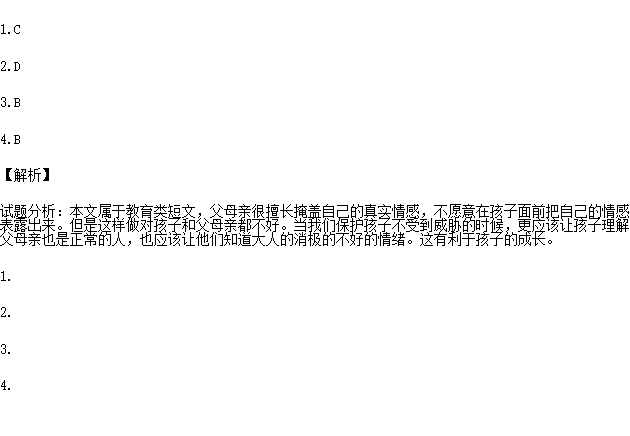

2019-05-03
阅读下列短文,从每题所给的四个选项(A、B、C和D)中,选出最佳选项。
When you’re a parent to a young child you spend a lot of time talking about feelings: about having to share about being disappointed because you may not have a cookie instead of broccoli(绿花椰菜) about the great injustice of a parent pressing the elevator button before the child has a chance to.
And in a parenting culture that’s increasingly concerned with centering children’s needs above all else mothers and fathers have become skillful at talking about their kids’ feelings while masking their own. But new research suggests that parents who hide their negative emotions are doing their children and themselves harm.
A study published this month says that when parents put on a faux-happy (假开心)face for their kids they do damage to their own sense of wellbeing and authenticity.
“For the average parent the findings suggest when they attempt to hide their negative emotion expression and over express their positive emotions with their children it actually comes at a cost: doing so may lead parents to feel worse themselves ” researcher Dr Emily Impett says.
It makes sense that parents often fall back on amping up (扩大) the positivity for the sake of their children—there are a lot of things in the world we want to protect our kids from. But children are often smarter than we expect and are quite in tune with what the people closest to them—their parents—are feeling.
There was a time about a year or so ago for example when I received some bad news over the phone; I was home with my four-year-old and so I did my best to put on a brave face. She knew immediately something was wrong though and was confused.
When I finally let a few tears out and explained that Mom heard something sad about a friend she was of course just fine. My daughter patted my shoulder gave me a hug and went back to playing. She felt better that she was able to help me and the moment made a lot more sense to her emotionally than a smiling mom holding back sobs. I was glad that I could feel sad momentarily and not have to work hard to hide that.
Relaying positive feelings to your children when you don’t feel them is a move the researchers called high cost—that it may seem like the most beneficial to your child at the time but that parents should find other ways of communicating emotions that “allow them to feel true to themselves”.
But this is also about children seeing the world in a more honest way. While we will want to protect our children from things that aren’t age-appropriate or harmful it’s better to raise a generation of kids who understand that moms and dads are people too.
1. What is the typical behavior of parents when they bring up their children?
A. Allowing their children chances to do things themselves.
B. Expressing their dissatisfaction with their children.
C. Hiding their true emotions from their children.
D. Sharing their favorite food with their children.
2.If parents put on a faux-happy face _______.
A. their children will be protected
B. their children will be taken in
C. they will feel happy as a result
D. they will undergo worse feelings
3. The author mentioned the example of her daughter to illustrate ______.
A. children are not so clever as parents think
B. children can often understand parents’ true feelings
C. it’s meaningful for parents to always look positive
D. it’s necessary to expose children to harmful things
4.We can conclude from the passage that _______.
A. protecting children from age-inappropriate things is important
B. it makes sense for children to know their parents’ negative feelings
C. children will admire their parents more because of being protected
D. separation from negative feelings helps children see the world honestly

